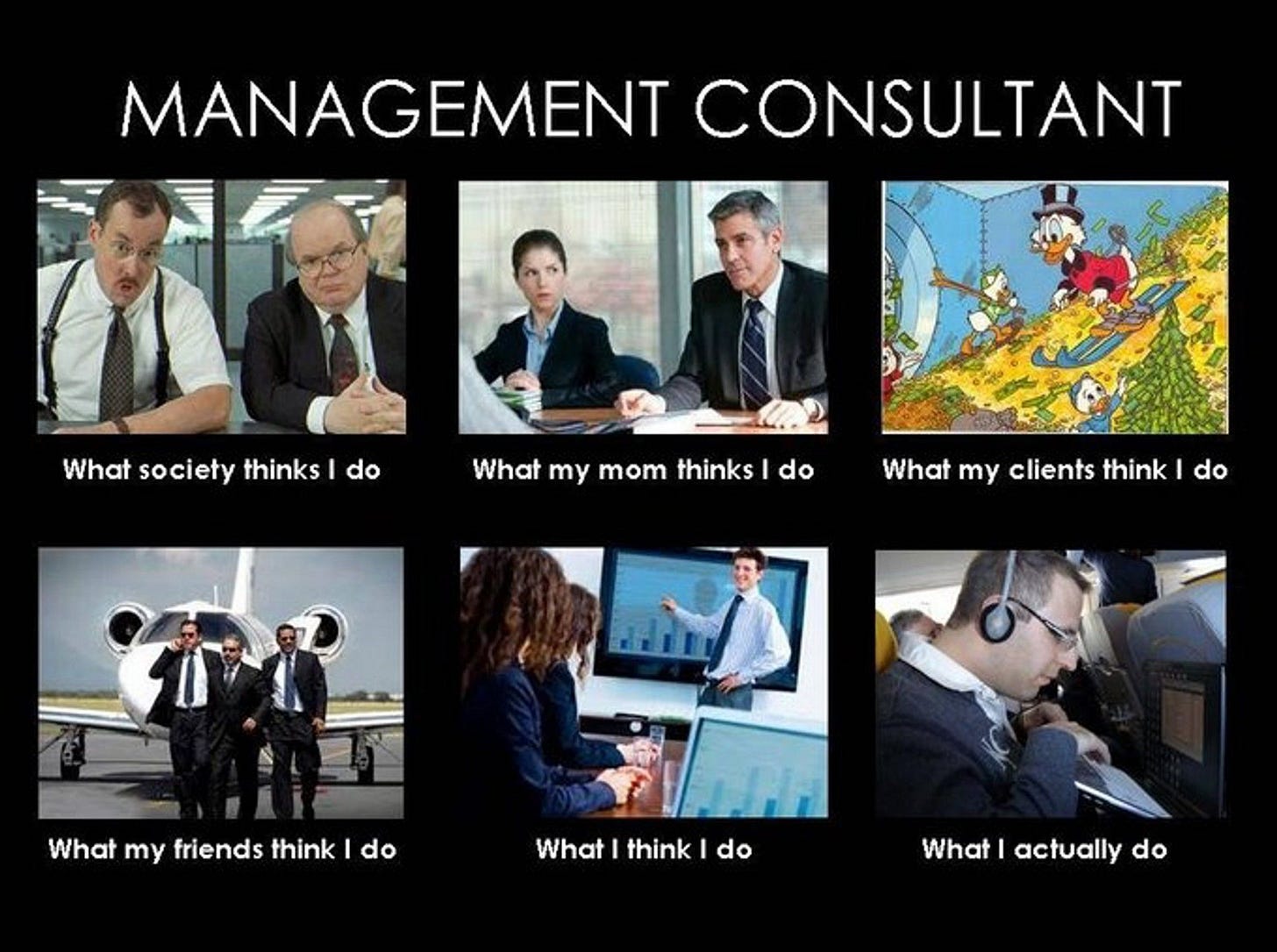What do consultants actually do?
Distinguishing between strategy consulting and tech consulting to determine which is a better fit for you
There’s plenty of memes and jokes about the idea of what a consultant is. I think this is because there is a general lack of education about what the role of consultants are in the operations and scaling of organizations. Through WiTC, I want to help address that knowledge gap. Whether you’re interested in exploring different types of consulting or just want to fact check your own understanding of the role, in this post, I walk through two main types of management consulting and discuss what skillsets and knowledge are leveraged for each.
But first, what even is management consulting?
Management consulting is a broad term that is used to describe individuals who support organizational leaders research and propose solutions that address business concerns and challenges. Companies will either hire external consulting groups (Some of the most popular are Mckinsey, BCG, and Accenture) or work with their own internal consulting group (I work for UnitedHealth Group’s internal consulting group) to identify the causes of existing challenges and determine new solutions. When people refer to “consulting” as a profession, they often mean management consulting. Within management consulting, there are many different subspecialties, such as operations consulting, strategy consulting, financial consulting, and tech consulting.
WiTC might be geared towards tech consultants, but we welcome all female and non-binary consultants to be part of our community!
This post focuses on the two main types that have grown in popularity: strategy and tech.
Strategy Consulting
Strategy consulting generally involves working on helping companies navigate difficult business issues like revenue growth, cost cutting measures, new market penetration, and performance improvement. This type of work is strategic in nature and involves planning, research, strategizing, and client relationship management.
🤔 Strategy consultants often answer questions like:
What are the best strategies for entering this new market?
What pricing strategy should we adopt for our products or services?
How can we integrate a newly acquired company successfully?
How do we address inefficiencies or performance gaps in our organization?
😇 Ideal for you if:
You have strong problem-solving skills - You enjoy tackling challenging problems and finding innovative solutions.
You like analytical and quantitative approaches - You excel at breaking down data, conducting analyses, and using insights to make recommendations
You have strong communication skills - You can communicate complex information in concise, persuasive, and understandable ways through presentations, reports, and recommendations
You can adapt quickly and like variety in your work - You can work on different projects across multiple industries and sectors and enjoy fast-paced, dynamic environments
😩 NOT ideal for you if:
You prefer routine work and want to stay in one place - Strategy consulting is not suitable for those who prefer predictable or routine workdays. Some consulting roles also require frequent traveling.
You are not interested in problem solving - Strategy consulting is focused on solving complex problems and working closely with data, so if you do not enjoy this, you may find this work unfulfilling
Typical Educational Background & Experience
Strategy consultants typically have at least a bachelor’s degree, often in business, economics, or other analytic disciplines. However, there is no required major needed to become a strategy consultant, because hiring is based off of your skillsets and ability to perform. Many consultants have experience in other roles, such as finance, marketing, project management, or data analysis. Some have prior entrepreneurial experience or have worked in industries such as technology, healthcare, or manufacturing.
Tech Consulting
There is a lot of overlap between strategy consulting and tech consulting, but tech consulting is more focused on determining how to use technology to solve an organizational problem. This can include transitioning from legacy platforms to new technology, implementing new solutions, managing multiple IT projects, or scaling a new solution across an organization. This type of work may involve strategy but is operational in nature and involves more execution and implementation work than strategy consulting.
🤔Tech consultants often answer questions like:
What technology will enable us to do this?
What technology could we use to solve this specific problem?
How do we leverage this technology to perform this specific task?
Which technology could we use to bring value to this organization?
What is the plan for transitioning from using this old technology to this new technology? How do we manage expectations from stakeholders and roll this out successfully?
😇 Ideal for you if:
You enjoy solving complex problems by applying technology solutions - You like to work with clients to identify technology related challenges and identify solutions that can enhance efficiency, customer experiences, or revenue generation. This can be anything from systems integrations, cloud transformation, cybersecurity, chatbot, or data dashboards.
You have a strong foundation in technology - You are able to understand both the technical and business side of technology to design effective solutions. Tech consultants are expected to use technical knowledge combined with business knowledge to analyze a client’s existing infrastructure and propose improvements.
You have strong communication skills - You can communicate complex information in concise, persuasive, and understandable ways through presentations, reports, and recommendations. Tech consultants must be skilled at explaining technical concepts to non-technical stakeholders.
You have project management experience and can work on cross functional teams - You like to manage projects, work across teams, and ensure projects stay on track for delivery. Tech consultants are responsible for overseeing the end to end implementation of new technology solutions, so managing timelines, budgets, and stakeholder relationships are in scope.
You can adapt quickly and like variety in your work - You can work on different projects across multiple industries and sectors and enjoy fast-paced, dynamic environments
😩 NOT ideal for you if:
You are not interested in tech - While tech consulting involves working with people, understanding and applying technology is at the core of the role. If you're not passionate about technology or don’t enjoy working on technical problems, tech consulting may not be the best fit.
You prefer routine work and want to stay in one place - Consultants frequently deal with different projects, industries, and technologies, and they often face new challenges. If you prefer a more predictable, structured, or stable work environment, tech consulting might not be the right choice.
You don’t like interacting with clients: If you’re not comfortable dealing with clients or stakeholders and prefer working independently without much external interaction, tech consulting is not the right fit. Communication with clients and understanding their needs is a key part of the role.
Typical Educational Background & Experience
Tech consultants typically have at least a bachelor’s degree, often in computer science, IT, engineering, or business with a focus on tech. However, there is no required major needed to become a tech consultant, because hiring is based off of your skillsets and ability to perform. Even if you had a non-technical background, taking courses, getting certifications, or completing bootcamps are a great way to build up your technical acumen for this role. Many tech consultants have experience in software development, systems analysis, networking engineering, IT consulting, or business analytics, but anyone with the foundational skills and a strong interest in technology can become a tech consultant.
You can work with me to create a personalized career roadmap that will get you that dream role in consulting!
So which one is better for me?
If you like working on high level strategy and like supporting senior leaders, strategy consulting is a better fit. If you want more exposure to technical problems and solutions and prefer to build and scale new solutions, tech consulting is better for you. However, keep in mind that there is a lot of overlap in the tasks performed by different types of consultants - you can be a strategy consultant working on implementing a new solution or you can be a tech consultant working primarily on strategy.
So my recommendation is to focus less on the title of the role and more on the work, team, and growth opportunities involved with the role.
While consultants are both revered and ridiculed in our society, there is no denying that consulting is often the stepping stone to leadership. Consulting is such a unique profession because it involves you with different areas of an organization and gives you a glimpse at both the leadership and team perspective, underlining what it takes to establish, maintain, and grow a successful company.



